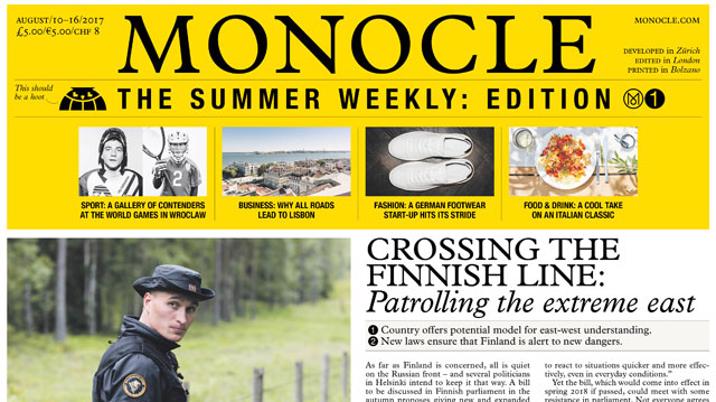
Launches
Dennis expanded its automotive portfolio with the launch of Enzo. “Ferrari is the world’s most famous and glamorous motoring marque,” said James Burnay, MD Dennis Automotive, and “we identified a gap in the market for a high-end, beautifully produced magazine that’s dedicated to the brand.” The quarterly title went on sale in July, priced £6.
Immediate Media, meanwhile, launched a kids’ magazine – PJ Masks, a monthly title following the adventures of Connor, Amaya and Greg and their alter egos, Catboy, Owlette and Gekko – a crime-fighting trio who “sometimes make mistakes, but always try to do what’s right”. According to editor Ruth Cassidy, “Inspiring stories and activities teach that even heroes can trip up if they’re too competitive, impatient or don’t tell the truth and that being a friend means helping, sharing and working together.” Can’t argue with that. The £2.99 magazine also comes loaded with goodies to attract their 3-5 year-old target market: wrist launcher, camera, key fob and keys, 65 stickers, a PJ Masks poster, a Cat-Car cut out and a 3D board game to make and play. In the kids’ market, clearly, almost as much thought goes into what’s on the front of the magazine as what’s inside it.
Further afield, Time Out continues to launch print magazines off the back of its websites – most recently in Philadelphia and San Francisco, showing that while some existing print titles are struggling to maintain legacy business models, digital enterprises have no qualms about launching targeted niche print products to build profile and extend reach. As Christine Petersen, CEO of Time Out Digital, commented: “For us, it is a successful formula to have strong digital, social, mobile and Live Events touchpoints, and adding print to that helps us strengthen our brand and drive our digital metrics. It also allows us to offer our advertisers increasing value and even more opportunities to connect with our unique audience.”
One publisher who has never been shy to proclaim the benefits of print is Monocle’s Tyler Brûlé. Speaking at the launch of Monocle – The Sunday Weekly, he said: "Everyone is very down about newspapers but there is something very exciting about this form. You don’t mind if it gets a bit of sun cream on it, or if it gets waterlogged. It can follow you around for the day – or for the week."
This August-only weekly 48-page newspaper features essays, news reporting, commentary and fresh photography. According to the publishers, it’s the “smart summer companion for the beach, café, piazza or plane”, distributed at key cities, airports, travel hubs and resorts. By the time you read this, this “seasonally targeted opportunity” will be over and they’ll be totting up the sales and returns. Was it a success? Well, you can check out the airport newsstand next August to see if it makes a reappearance.
Acquisitions
In early July, the National Union of Journalists, came out fiercely against Newsquest’s proposed takeover of Isle of Wight County Press. In a statement, it said, “we know only too well what a Newsquest takeover means. We all have friends and former colleagues who have worked for once-independent papers now run by Newsquest. Note the past tense – they used to work there. Take a look at the fate of newspapers taken over by Newsquest, and you will see sweeping job losses and a huge drop in quality.”
The IWCP Board had already unanimously recommended Newsquest’s offer to shareholders, and at the EGM, 100% of votes were cast in acceptance.
Henry Faure Walker, Newsquest's CEO proffered: “We want to facilitate a structure whereby they can benefit from the scale and resources that Newsquest can provide whilst enabling them to carry on doing what they do best – namely providing a first class and unrivalled local editorial and advertising platform for the people of the Isle of Wight and its businesses.”
Two deeply divergent views; for the sake of the residents of the Isle of Wight, I hope the NUJ is proved wrong.
There were a number of less controversial acquisitions in the magazine world. Dennis acquired MoneyWeek. The brand will join Dennis’ Current Affairs division, which includes The Week and The Week Junior, TheWeek.co.uk and The WeekDay app. Not entirely sure that The Week and three spin-offs quite constitutes a ‘division’…
Future extended its current highly acquisitive streak, buying Centaur’s home interest portfolio. The Bromsgrove-based titles, which include Real Homes and Period Living, always seemed a slightly odd fit at the London based B2B media group, publishers of Marketing Week, Creative Review and The Lawyer. As Centaur’s long-term strategy is to become a pure focused B2B company, this sale looks very sensible.
Future certainly seems happy. Zillah Byng-Thorne, CEO, commented: “This will significantly add to our scale and momentum. We have a track record in profitably integrating acquisitions and we expect the acquisition of Centaur’s Home Interest division to be materially earnings enhancing in the first full year of ownership.”
Meanwhile, Centaur announced an acquisition of its own: MarketMakers, a company it describes as a “fully integrated end to end B2B marketing services business”. Andria Vidler, Centaur’s CEO said: “The process of taking Centaur up the B2B value chain continues, and these transactions are very significant steps forward in our ambitions.”
Social media
The 1st of August saw British Vogue (hot on the heels of French Vogue) launch on Snapchat Discover. The first edition included an interview with new editor-in-chief Edward Enninful, interactive features, styling tips, product roundups and some classic Vogue photography – all beautifully animated, apparently.
Condé Nast International Digital has recruited a dedicated Vogue International Discover team, based out of CNI’s offices in London. Working with the Vogue digital editor in each country, this editorial team of producers and interactive designers is led by editor Sarah Schijen and is creating a significant amount of exclusive content (snaps, video and long form journalism), on behalf of each local market.
“We see Snapchat Discover as an opportunity to bring British Vogue to the fashion influencers of the future. Our audience for the Snapchat Discover Stories will overwhelmingly be aged 13-24, and the content will reflect this; contemporary, vibrant and shareable. Vogue is the culture of fashion for every generation,” said Schijen.
Elsewhere at Condé Nast, Glamour’s August issue was dedicated to Instagram. Jo Elvin, editor-in-chief, explains: “We’ve collaborated with some of the world’s most influential Instagrammers and we’ve also used @glamourmaguk’s Instagram clout to cast exciting new faces for our beauty pages from our own audience. We’re also introducing the Glamour audience to brilliant under-the-radar talents and showcasing a host of new power players in our first ever Instagram Power List. Instagram really is the platform that’s changing the world and I’m delighted that so many talented social media stars jumped at the chance to help us create this very special issue.”
Glamour currently has 316k followers.
Press regulation
Providing further evidence of the increasingly symbiotic relationship between publishing and social media, IPSO published new guidance on using material taken from social media. These attempt to provide some clarity over the vexing question of what can and can’t be republished from social media. As IPSO’s head of standards Charlotte Urwin said: “This guidance provides editors and journalists with a framework for thinking through these questions and some examples of relevant decisions by IPSO’s Complaints Committee.” Much hinges on to what extent, if at all, the material is in the public domain and the nature of the material itself. Given the insatiable 24/7 demands of the digital publishing cycle, it’s likely that IPSO’s case history in this area will expand rapidly.
In July, IPSO also launched a public consultation on a proposed change to how it regulates global news websites. To paraphrase, the proposal is to limit IPSO’s jurisdiction to material published by publishers with a newsroom presence in the UK, where that material covers events in the UK or relates to UK residents or nationals. (For the record, everything contained in UK print editions continues to remain within IPSO’s remit.)
What this means is that for publishers like the Guardian and Mail, with substantial international operations, stories they source outside the UK about non-UK residents / citizens, are none of IPSO’s business.
As Peter Preston wryly noted in the Observer, "That’s a practical enough solution, on a par with the position of US-owned websites producing UK editions without bending the IPSO knee. But don’t, perhaps, cite that bit from the IPSO code that talks about honouring its self-regulation “not only to the letter, but in the full spirit.”
Brand extensions
Hearst has announced plans to launch Esquire whiskey lounges across India. "The Esquire brand has global recognition, epitomising cool confidence, wit and style; the lounges will reflect that, offering guests a truly unique experience,” promised Steve Ross, vice president, global chief licensing director.
Time Inc UK’s recently launched TV production arm – TI Productions UK - secured its first commission, a 30-minute documentary for BBC Three. Entitled Stacey Dooley Investigates: Kids Selling Drugs Online, the show follows Dooley as she ventures undercover to investigate Britain’s digital drug dealers.
Harper’s Bazaar is launching the Bazaar At Work Summit – a new day-long conference which will bring together female leaders for a day of talks, panel discussions, interactive workshops and networking opportunities. Victoria Archbold, director of events & sponsorship, Hearst Live, says, “Following the extremely popular Bazaar At Work programme of events, the Bazaar At Work Summit is a dynamic extension of the brand. The summit will provide a unique opportunity for Bazaar’s thoughtful and intelligent audience to connect with other brilliant women.”
Meanwhile, over at London Bridge, News UK announced a new venture – Startup Lab, which will take up to six small companies and host them in a month-long incubator programme to help develop new thinking, new ways of working and find new revenue streams for “our company and theirs”, says the publisher.
The breadth and depth of brand extensions and new revenue streams being dreamed up by publishers continues to amaze.
End of an era
And, finally, it was baton-change time at Tindle Newspapers as Sir Ray handed over to son, Owen. In his farewell address, the 90-year-old said: “Let me just say a word about the future of our industry. I see a greater need for our local press now than I have ever seen in my 80 or so years connected with this business. Yes, local papers will survive. Local news in depth is what people need.”
Hear, hear! Here’s hoping that Owen demonstrates the same passion for, and belief in, newspapers in the years ahead.
InPublishing's free e-newsletter, InPubWeekly, goes out every Thursday morning. You can sign up for it here.










